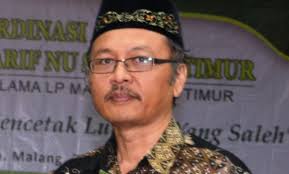Surabaya, NU Online
Chairman of the East Java's Maárif NU Prof. Dr. KH. Abdul Haris said that the Islamization process taking place in Nusantara (the archipelago) was inseparable from the process of acculturation.
"As already known that the spread of Islam in the archipelago is conducted through such aspects a normative, art and culture," he told NU Online here on Friday (9/9), saying that society and culture in which Islam was disseminated were an empirical nature.
"In this context, as intelligent beings, humans are basically religious and consequently will know best their own world. In a consequence, through their cultural behavior, humans will constantly improve their self-actualization. Therefore, in each acculturation, humans create, utilize, and change everything in accordance with their needs," he said.
According to Kiai Haris, within the framework of acculturation, there emerges what is known as local genius that could be defined as the ability to absorb while conducting selection and actively dealing with the cultural influences in order to achieve a new unique creation that is not contained in the nation that brings its cultural influence.
He added that the ability of Islam to adapt to local cultures had paved the way for reaching the grassroots.
"As a result, Islamic cultures were strongly influenced by farmers and the inland ones, so that the Islamic cultures could undergo a transformation not only because of the geographical distance between the Arab and Indonesia, but also because of cultural distances." (Masdar)
Terkait
Terpopuler
1
Khutbah Jumat: Ramadhan, Melatih Sabar, Memperkuat Syukur
2
Khutbah Jumat: Tiga Kebahagiaan Orang Puasa
3
Gerhana Bulan Total Bakal Terlihat di Seluruh Indonesia pada Selasa 3 Maret 2026, Dianjurkan Shalat Khusuf
4
Gus Yahya Sebut Kepergian Ketum Fatayat Margaret adalah Kehilangan Besar bagi Keluarga NU
5
Khutbah Jumat: 4 Cara Menghidupkan Malam Ramadhan dengan Ibadah
6
Ali Khamenei Wafat dalam Serangan Israel-Amerika
Terkini
Lihat Semua



